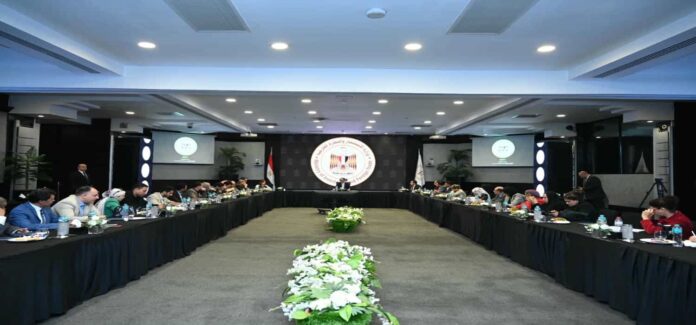
Arab Finance: Engineer Hassan Al-Khatib, Minister of Investment and Foreign Trade, held an extensive press conference with the participation of all journalists accredited to the Ministry, during which he reviewed the state’s policies aimed at facilitating the movement of foreign trade for investors, as well as the Ministry’s efforts to attract more investments and increase Egyptian exports to foreign markets.
The Minister also stressed that the Ministry seeks to provide a more competitive investment climate that is attractive to investment by working to provide a supportive institutional and legislative environment, simplifying procedures and overcoming obstacles facing investors, noting the complete transparency and clarity of all non-tax procedural and financial burdens imposed on the investor during the various stages of the project. And work to organize it.
The minister explained during the press conference that the ministry’s plan aims to double the size of the economy and create a flexible and stable economic environment that leads to investor confidence in the success of his project, its expansion and achieving success in light of an investment climate characterized by transparency and competitiveness, adding that the government’s vision that it set in the investment file for the current period is to focus on Supporting the private sector as the primary engine of the economy, by providing sufficient opportunity and space to participate in achieving economic growth.
Al-Khatib said that the government has developed clear and stimulating policies for investment and trade, which include reducing non-tax and procedural financial burdens on the investor, pointing out the importance of clarity and stability of policies and clarity of burdens and fees for the investor.
The Minister indicated that a plan has been drawn up to implement these policies in two phases. The first (current) phase includes addressing the most prominent financial deductions applied to companies on a periodic basis. The percentage of the Training and Qualification Fund was reduced from 1% of profits to 0.25% of the minimum wage. Insurance, while dealing with the retroactive effect in coordination with the Ministry of Labor, and amending the solidarity contribution tax to be calculated on profits instead of revenues, and coordination is underway with all concerned parties in this regard, pointing out that the second phase will focus To analyze each sector separately in coordination with all parties
Al-Khatib confirmed the development of an ambitious plan to gradually reduce the customs release time to two days by 2025. The plan is based on two phases: The first phase aims to reduce the release period to 4 days, which enhances the efficiency of customs operations, while the second phase seeks to reach only two days, which enhances competitiveness. It reduces logistics costs significantly, which reflects positively on the business environment and saves huge costs on the economy.
Al-Khatib stressed that these and other policies and reforms would make Egypt distinguished by an open trade policy to the world, contribute to increasing exports, providing an attractive environment for the local industry, and supporting its competitiveness. They would also contribute to placing Egypt at an advanced stage in global trade indicators to be among the 50 largest countries. Globally during the coming period, then moving to the top twenty positions by 2030 while achieving a qualitative leap in our exports.
Al-Khatib said that the state supports the localization of industry, especially the local industry, for which it has taken some measures related to protecting it from dumping, pushing towards its development and support as it is the backbone of the national economy, as well as giving the private sector the pivotal role in advancing the economy, with the state playing the role of watchdog. Regulator and governance to ensure a fair and transparent investment environment.
Related news

